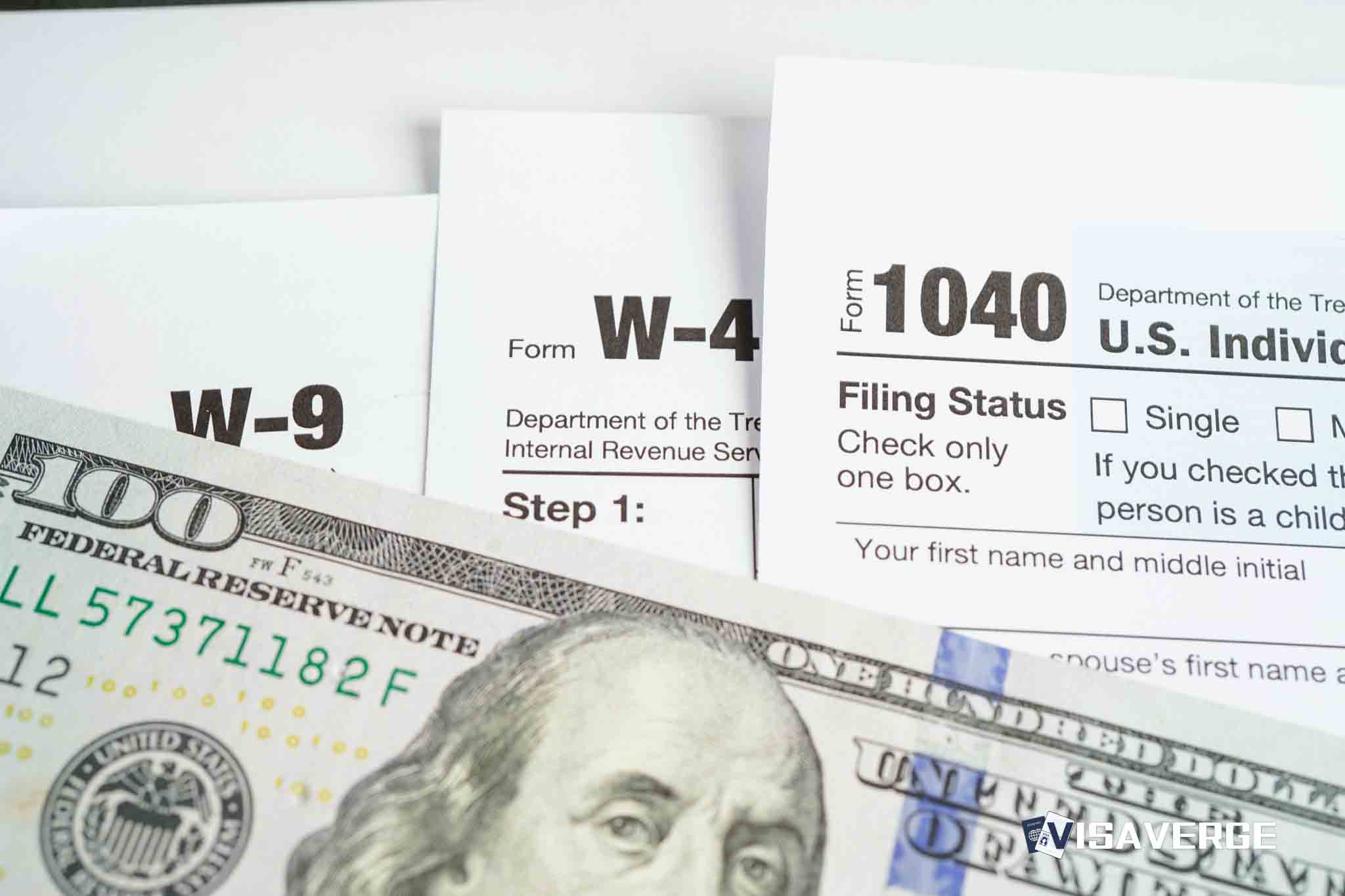Navigating State Tax Returns for F1 Visa Students in the U.S.
Every year, F1 visa students face a common challenge: filing their state tax returns. Understanding and complying with U.S. tax laws can be a daunting task, especially when you are studying abroad and juggling a multitude of other responsibilities. However, proper tax filing is essential, as it ensures compliance with the law and can potentially help avoid legal complications.
Understanding Nonresident Tax Status
Most F1 students fall under the category of “nonresident aliens” for tax purposes. This means they are not U.S. citizens, and they do not pass the green card or substantial presence tests. As nonresidents, F1 students are only required to pay taxes on income that is earned in the U.S., such as wages, tips, scholarship funds, and investment income.
Knowing Your State’s Tax Laws
Each state in the U.S. has its own tax laws, so it’s crucial for F1 students to familiarize themselves with the requirements of the state where they’re residing. Some states do not have an income tax, while others may require you to file a return if you earned income there.
For students with nonresident state tax filing obligations, the process begins by determining whether the state believes you have earned income that is subject to tax. Income from employment, internships, or practical training programs such as OPT (Optional Practical Training) or CPT (Curricular Practical Training) usually counts.

F1 Student Tax: Documents and Deductions
Before filing state taxes, ensure you have all necessary documents like Form W-2, Form 1042-S, and/or Form 1099, if applicable. These forms report your income from the previous year. It’s important to note any treaty between your home country and the U.S. that might provide tax exemptions.
Deductions reduce your taxable income, and as a student, you might be eligible for certain education-related deductions. Keep in mind, though, that as nonresidents, F1 students cannot claim the standard deduction.
Filing Your State Tax Return
Completing your nonresident state tax filing involves several steps:
- Gather Your Documents: Collect all relevant income statements and keep an eye out for any mail from the IRS or your state tax department.
- Understand the Forms: The specific form you need to file your state taxes will depend on the state you are in. Common forms include the nonresident tax return form or a part-year resident return, in case you moved during the year.
- Deadlines: Pay attention to the tax deadlines. Most states align with the federal tax deadline in mid-April, but there can be variations.
- Get Help If Needed: If you find the process overwhelming, reach out to your university’s international student office, a tax professional, or use accredited tax software designed for nonresident filings.
“When in doubt, seek professional advice,” says John Doe, a tax expert. “F1 students have unique filing needs and it’s better to get it right the first time than to deal with complications later.”
Finding Resources and Assistance
Many resources are available to help F1 visa students with their state tax returns. The IRS Free File program offers options if you have a simple return. Additionally, accessing the IRS’ Publication 519, “U.S. Tax Guide for Aliens,” and your state’s department of revenue website can provide guidance specific to your situation.
Conclusion
Remember, filing your state tax return accurately and timely is crucial. While it may seem complex, understanding the basics of nonresident state tax filing and utilizing available resources can help simplify the process.
If you feel uncertain about any aspect of your tax filing, don’t hesitate to seek professional assistance. Properly handling your F1 student tax matters not only keeps you compliant with U.S. tax laws but also can prevent problems that might affect your visa status. Stay informed, stay organized, and when April rolls around, you’ll be ready to submit your tax return with confidence.
Still Got Questions? Read Below to Know More:
If I did an unpaid internship on my F1 visa, do I still need to file a state tax return
While you were on an F1 visa and participated in an unpaid internship, generally you do not need to report income if you did not earn any money. However, you are still required to file Form 8843, “Statement for Exempt Individuals and Individuals with a Medical Condition” with the IRS if you were in the United States during the last tax year. This form is used to explain your exempt status as someone temporarily in the U.S. under an F1 visa for education purposes.
For state tax returns, the requirement to file can vary depending on the state’s tax laws. Since unpaid internships do not provide income, you typically would not need to file a state tax return if you had no other income in that state. However, there might be other reasons you’d need to file a state return, such as if you have earned income from other sources within the state, or if you’re claiming a refund of any state taxes withheld from other income you received.
It’s always a good idea to check the specific tax requirements for the state where you resided or where your school is located. Most state tax websites have sections dedicated to nonresidents or part-year residents that can guide you through the filing requirements. Additionally, you can visit the official IRS website for more information on Form 8843: IRS – Form 8843.
Remember, while your unpaid internship might not necessitate filing a state tax return for income reasons, it’s crucial to stay compliant with all IRS guidelines for your visa type regarding presence and reporting in the U.S. If you’re in doubt about your specific situation, consulting a tax professional or your university’s international student office can provide personalized guidance.
Can F1 students receive a tax refund for any state taxes that were withheld from their paychecks
Yes, F1 students can receive a tax refund for state taxes that were withheld from their paychecks if they have overpaid based on their actual tax liability. Typically, as international students on F1 visas, you may not earn enough income to owe significant taxes, and as such, any excess amount withheld from your paycheck could be refunded when you file your state tax return. Here are the steps you should follow:
- Check Your State Tax Requirements: Each state in the U.S. has different tax laws, so it’s essential to understand the rules that apply to the state where you worked and earned income. To find accurate information, visit the official state tax website where you are or were a resident. For instance, for New York, you’d check the New York State Department of Taxation and Finance.
- Prepare Your Tax Documents: Gather all the necessary tax documents, such as your W-2 form, which shows how much you earned and the amount of taxes withheld. You may also need Form 1042-S if you received a scholarship or fellowship.
-
File Your State Tax Return: Complete the appropriate state tax return forms. You may be eligible to use free electronic filing options offered by some states. If you overpaid your taxes, you would indicate the amount to be refunded on your tax return. Make sure to file by the state’s tax deadline to avoid late penalties.
Remember that while F1 students are typically exempt from paying FICA taxes (Social Security and Medicare), state taxes are different and you may still be liable to pay those. If you find the process complicated or if your tax situation has other complexities, consider seeking help from a tax professional who has experience with nonresident tax issues. The IRS website provides resources and can also guide you on federal tax matters, but for state tax issues, always refer to your specific state’s tax authority.
“When in doubt, always consult with a tax professional or utilize the resources provided by the tax authority in your state,” as they can provide the most up-to-date and precise advice tailored to your situation.
How can I find out if there’s a tax treaty between my home country and the U.S. that affects my state taxes
To determine if a tax treaty exists between your home country and the United States which could affect your state taxes, you’ll want to follow these steps:
- Visit the IRS Website: The Internal Revenue Service (IRS) maintains a comprehensive list of tax treaties that the U.S. has with other countries. You can find the information by visiting the United States Income Tax Treaties – A to Z on the IRS website. Look for your home country on this list to see if an agreement is in place.
- Review the Treaty Details: Once you find a treaty, review the provisions to understand the types of income that are covered and any special qualifications or exemptions that apply. While tax treaties primarily address federal income taxes, they may have implications for your state taxes depending on the state’s rules for conforming to federal tax treaties.
“Many states use your federal taxable income as a starting point for state tax calculations. Hence, if a tax treaty between your home country and the U.S. reduces or exempts your federal taxable income in some way, it could possibly lower your state tax bill as well.”
- Consult Your State’s Tax Authority: Tax treaties are federal-level agreements, and not all states automatically abide by these treaties for the purpose of calculating state taxes. Contact your state tax authority or visit their official website for the most up-to-date information on how your state uses federal tax treaties. Some states may require you to add back income exempted by federal treaties for state tax calculations.
Remember, each state has its own regulations regarding the applicability of income tax treaties, so it’s crucial to check with local authorities. For example, the California Franchise Tax Board or the New York Department of Taxation and Finance would be the places to go for information specific to those states. If you’re unsure of what to do, it might be best to consult with a tax professional who has expertise in international tax law. They can help clarify the impact of any tax treaty on your state tax responsibilities.
If I moved from one state to another while on an F1 visa, do I need to file tax returns for both states
Yes, if you moved from one state to another while on an F1 visa, you may need to file tax returns for both states depending on the individual state tax laws and if you had income in either or both states. F1 visa holders are generally considered nonresident aliens for tax purposes unless they meet the Substantial Presence Test, which usually requires being in the U.S. for a substantial period of time. Here are the general steps you should follow:
- Determine Residency for State Tax Purposes:
- Look into both states’ tax laws to understand if you’re considered a resident, part-year resident, or non-resident for each. This usually depends on how long you’ve lived in the state and the source of your income.
- If you’re a resident or part-year resident, you might need to file a tax return for that state.
- Evaluate Your Income Sources:
- If you earned income in both states during the tax year (from employment, scholarships, or any other source), you might need to file a return in both states.
- Income earned in the U.S. while on an F1 visa can include on-campus employment, practical training (OPT or CPT), and scholarships or grants.
- File State Tax Returns if Necessary:
- Prepare your state tax returns using the correct state forms, and consider any tax withheld or payments made to each state during the year.
For authoritative information on your federal tax requirements, refer to the Internal Revenue Service (IRS) website. However, each state has its own taxation authority, so you should check with the appropriate state tax websites for specific filing requirements. It’s also important to remember that state tax rules vary widely, so the need to file in both states is case-specific.
For further guidance, you can refer to the following official resources:
– IRS for Federal Taxes
– To understand specific state tax regulations, you should visit the official tax website of the state you moved from and the state you moved to. Here are two examples:
– California Franchise Tax Board: https://www.ftb.ca.gov/
– New York Department of Taxation and Finance: https://www.tax.ny.gov/
Please note that most states have a filing deadline around April 15th, coinciding with the federal tax return deadline. It’s crucial to check each state’s deadline to avoid penalties for late filing. If you find state tax laws confusing, consider seeking help from a tax professional who is experienced with state taxes and F1 visa situations.
What should I do if I received a scholarship from my university; does it count as income for state tax purposes
If you received a scholarship from your university, it’s important to understand how it may impact your taxes. Not all scholarship funds are considered taxable income. According to the IRS:
“A scholarship received by a student who is a candidate for a degree can be used to pay for tuition and fees required for enrollment or attendance at the educational institution, or for books, supplies, and equipment required for courses at the educational institution. These amounts are not taxable.”
However, any portion of the scholarship that is used for incidental expenses like room and board, travel, and optional equipment, or any amount given to you for teaching, research, or other services required as a condition for receiving the scholarship is taxable and must be included in your taxable income.
For state tax purposes, the treatment of scholarship income can vary from state to state. Many states follow the federal tax guidelines, but some have different rules. You should check your specific state’s department of revenue or taxation for guidance. For example, California conforms to federal tax treatment of scholarships whereas other states might have their own stipulations.
To ensure you’re following all applicable rules, and to find out whether your scholarship counts as income on your state tax return, visit the official state tax website where you reside or consult a tax professional. Here is a link to an official source, the IRS’s Tax Benefits for Education: Information Center, which provides federal information on the subject: IRS Tax Benefits for Education. Remember, it’s important to report your income correctly to both federal and state tax authorities to avoid any issues. If in doubt, seeking advice from a tax expert is always the best course of action.
Learn today
Glossary or Definitions:
- F1 Visa Students: International students studying in the United States under an F1 visa, which is a nonimmigrant visa for academic and language study programs.
- State Tax Returns: The forms and documents that individuals must file with their state government to report and pay taxes on income earned within that particular state.
-
Nonresident Tax Status: A tax classification for individuals who are not U.S. citizens and do not meet the criteria for being a resident for tax purposes, according to the green card or substantial presence tests. Nonresident aliens are only required to pay taxes on income earned in the U.S.
-
Nonresident Aliens: Individuals who are not U.S. citizens and do not meet the criteria for being classified as residents for tax purposes.
-
Green Card Test: A test used to determine an individual’s tax residency status, which is based on whether they hold a U.S. green card (lawful permanent resident status).
-
Substantial Presence Test: A test used to determine an individual’s tax residency status, which is based on the number of days they have been physically present in the U.S. over a period of three years.
-
Income Tax: A tax imposed on individuals or entities based on their earnings, such as wages, tips, scholarship funds, and investment income.
-
State Tax Laws: The laws and regulations established by each individual state regarding the imposition and collection of taxes.
-
Form W-2: A form that reports an employee’s annual wages and the amount of taxes withheld by their employer.
-
Form 1042-S: A form used to report income paid to nonresident aliens, including wages, scholarships, and fellowships.
-
Form 1099: Various forms used to report different types of income other than wages, such as interest, dividends, and self-employment income.
-
Tax Exemptions: Provisions in tax laws that allow certain individuals or entities to exclude or reduce their taxable income.
-
Deductions: Expenses or allowances that reduce an individual’s taxable income, potentially resulting in a lower tax liability.
-
Standard Deduction: A predetermined amount that individuals can subtract from their taxable income without having to itemize their deductions.
-
Nonresident Tax Return: A specific tax return form designed for nonresident individuals to report their income and calculate their tax liability in a particular state.
-
Part-Year Resident Return: A tax return form for individuals who have moved to or from a state during the tax year, allowing them to report income earned both inside and outside the state.
-
Tax Deadlines: The specific dates by which individuals must file their tax returns and pay any taxes owed to the state government.
-
IRS: The Internal Revenue Service, the agency responsible for administering and enforcing federal tax laws in the United States.
-
Publication 519: “U.S. Tax Guide for Aliens,” a document published by the IRS that provides tax guidance for nonresident aliens.
-
Department of Revenue: The state government agency responsible for administering tax laws and collecting taxes within a particular state.
-
IRS Free File: A program offered by the IRS that provides online tax preparation and filing services for eligible individuals with simple tax returns.
-
Accredited Tax Software: Tax preparation software that meets the standards set by the IRS for accuracy and security in processing tax returns.
-
Visa Status: The immigration status granted to an individual by the U.S. government, which may be affected by compliance with tax laws and regulations.
-
Professional Assistance: Consulting with a tax professional or specialist who has expertise in tax matters and can provide guidance and advice on filing taxes accurately and in compliance with applicable laws.
Don’t let tax filing stress you out, F1 visa students! Understand nonresident status, know your state’s tax laws, and gather your documents. Seek help if needed and utilize resources like the IRS Free File program and Publication 519. Visaverge.com has more tips to simplify your tax filing. Stay in the know and file with confidence!









